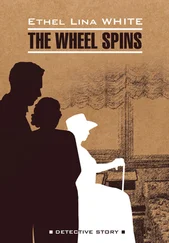Within twenty-four hours, through the Wireless of village communication, the rumour spread that Miss Asprey's moral character had been attacked in an anonymous letter from an evil-minded person, who was jealous of her.
Miss Corner was sitting cross-legged in her library, smoking and reading, when her cook-housekeeper told her about the letter. The novelist was on friendly terms with her staff, as she studied their comfort; in fact, it was rather a local grievance that their bathroom was far superior to Miss Asprey's.
The housekeeper's story fell rather flat, for Miss Corner was still bewitched by Edith Sitwell's Bath . She might sell cheap home-brew herself, with her insipid romances and absurd school-stories, but she could appreciate rare vintage—and her library-shelves testified to selective literary taste.
She puffed away grimly at her cigarette, as she mechanically listened to the tale, while the shrunken pupils of her eyes betrayed the fact that she was still marooned in the Eighteenth Century, and half-drunken from the savour of exquisite language.
'Russets, shalloons, rateens and salapeens.' The sentence swam through her brain, like an elusive gust of mignonette borne on a vanished summer breeze.
Her housekeeper—Mrs. Pike—became conscious that her story had fallen unaccountably flat, and began to apologise for it.
"Of course, madam, we don't know all that was in the letter. Depend on it, we've only been told the half."
"In every story," remarked Miss Corner, "there's the half we tell, and the half that others tell, and the half that's true. Add that up, Mrs. Pike, and see what it comes to."
Then, taking pity on the woman's bewilderment, she changed the subject.
"I'm throwing a little bun-fight this afternoon," she said. "You must provide a lavish tea, for the look of the thing, for it'll all be left. I'm expecting Mrs. Sheriff, Mrs. Scudamore, and Lady d'Arcy."
"Well, you'll have something to talk about, for a change," remarked Mrs. Pike, as she produced her housekeeping-tablet.
As a matter-of-fact, the incident of the anonymous letter only seemed to prove that the life-blood of the little community was too healthy to admit infection. It was received either with raised brows of polite incredulity, or with gusts of healing laughter. Yet, even at this early stage, certain events indicated that the village was not immune to poison, but only resistant.
Dr. Perry was motoring out to visit a country patient, when, at the cross-roads, he met Vivian Sheriff—the Squire's daughter—who was also driving a Baby Austin. They were not especially friendly, but their cars always insisted on stopping to fraternise with each other, so their owners had to make the best of it.
"I'm just cooling my engine," explained the doctor hastily. "We've been exceeding the speed-limit. How's your little car behaving?"
"Never better," boasted Vivian. "But my petrol's rather low." Then, as though dimly conscious that she was clutched in the grip of machinery, and had to await its Robot pleasure, she began to gossip.
"Heard about Miss Asprey's anonymous letter?" she asked.
The doctor had not heard; but, as he listened to Vivian, his eyes gleamed with interest, which gave way to resentment. This, then, was the origin of the Rector's secret mission. He, himself, had been present at the birth of an intriguing human development, and had been shut out in the cold.
But the Rector, apparently, had lost no time in spreading the story. In the doctor's eyes his admirable policy of silence was now revealed as pure pose.
'The fellow's nothing but a human gramophone,' he thought contemptuously, as the cars grew suddenly tired of each other and agreed to start.
An hour later, when Dr. Perry met the Rector trudging along the road with his fishing-tackle his greeting was rather cool. He still felt slightly disgusted, while the Rector was horrified by his own unworthy suspicion, as Dr. Perry's parting remark kept stirring in his mind. How did the doctor know that the letter attacked Miss Asprey's moral character?
Both men talked of fly-fishing, but did not refer to the letter. The doctor offered the Rector a lift, which was refused. A little of the poison had spread.
The subject was also raised at the Hall, where Lady d'Arcy was having lunch with the Squire's family. Mrs. Sheriff, who was a youthful, flaxen-haired little person—rather gummy, but with a sweet and self-sacrificing disposition—was human enough to be mildly excited.
"I wonder who wrote it," she exclaimed, with school-girlish interest.
Her husband pulled down his lip, and the vague Lady d'Arcy drifted up to the occasion, for the Rector had made no idle boast that the village was almost free from the vice of scandal.
"Not one of us ," said Lady d'Arcy, in her lightest voice and changed the subject.
Her speech sounded above reproach, but the Squire frowned, pulled his lip again, and grew thoughtful. The village accepted no one who had not been a resident for fifteen years. Companions and governesses did not count, of course, while Mrs. Perry crept in under her husband's wing.
There remained only the Martins—the rich absentee owners of the Towers—and the local novelist.
Miss Julia Corner had entirely returned from Bath, and was her usual genial self when she acted as hostess at her tea-party. She wore a white muslin peasant blouse, with juvenile short sleeves and a round neck. A string of corals encircled her fat neck and her grey fringe was freshly-cut. She flourished her tea-pot dangerously as she beamed upon her guests, who were of the younger generation.
Owing to some curious run of bad-luck, both the Squire's wife and Lady d'Arcy had sent deputies. Kind little Mrs. Sheriff—when she pleaded a racking headache—had rebelled against her husband, and insisted that Vivian should take her place. The vague Lady d'Arcy, who was sufficiently practical to make use of others—merely told Joan to offer her apologies.
Joan's inventive powers proved equal to the strain, and she was only too glad to stay, for, although she had acquired a certain respect for Art, in Chelsea, she was a backslider where Miss Corner's comfortable home was concerned.
It had its own electric-plant, so that the novelist was able to indulge her passion for brilliant lighting, and it possessed a perfect system of central-heating. In spite of the scraps of Fourteenth-century barns which composed its outer walls, its interior was entirely modern, with built-in drawers and cupboards, amusing metal furniture, aluminium-sprayed rubber curtains and planet-lamps. In the place of pictures, there were numerous mirrors.
"I like to see a lot of Julias," explained Miss Corner. "Those fat girls are my company. You've heard, haven't you, how a fat girl can love, even if no one loves her?"
Vivian's smile was polite and non-committal, for she was not feeling entirely at her ease. She was a pretty girl—fair-haired and turquoise-eyed—with exquisite colouring. Like most of the local ladies, she had the delicate air of one reared entirely under glass, so that, in comparison with her, Joan looked like a rosy apple placed beside a hot-house peach.
They appeared to be the same age, although, in reality Vivian possessed only the sterilised youth of the village.
She raised her gossamer brows when Joan began to talk about the anonymous letter.
"What do you think about it, Miss Corner?" she asked.
"Thrilled," replied the novelist. "It's been said that the anonymous letter-writer is the only really interesting criminal."
"I think it's disgusting," said Vivian. "And to send it to Miss Asprey—of all people."
"Why should she be exempt?" demanded Miss Corner. "She's not sacred, is she?"
"No. But she's so—so spiritual. I've rather a passion for her. I think she must have an aura—a blue or violet one. Anyway, I'm sure she's an influence for good. Whenever I am at 'The Spout', I'm conscious of being in a state of perfect peace."
Читать дальше












